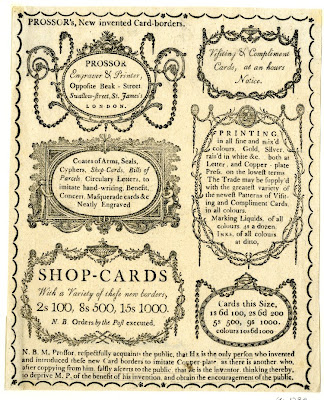 |
| What a great job title: Drawing Master |
 |
| "Rose, Fancy Ruling and Graduating Engines"— geometric lathes that produced the ornamental designs and sets of fine lines used on the border of this card and the ones above |
 |
| "Dealer in Natural and Artificial Curiosities..." My God, think of the things an antiques dealer in 1801 must have had... |
 |
| Coates
of Arms, Seals, Cyphers, Shop-cards, Bills of Parcels, Circulary
Letters, to imitate hand-writing, Benefit, Concert, Masquerade cards |
Several years ago I was chatting with an Italian friend whose English had been heavily inflected to begin with, and after a few years living in Paris it was downright mysterious. He complained of some activity that was "a true chronophage..."
What?
"What is in English? Very time consuming"
"Chronophage" = literally "time eating." Yes!
Herewith the results of some of my chronophageous pasttimes (looking at old ephemera online; gathering word lists): 18th and early 19th century British trade cards from the exhaustive collection in the British Museum. As per my previous post on Brooklyn trade cards, what has been interesting me most these days is the wording: The lists of strange and exotic items available, the curious and arcane services proffered.
I love the fact that these items were as common as today's supermarket list of low-fat yogurt, BBQ sauce, and lighter fluid, but I have little or no clue what any of them are.
I love the fact that these items were as common as today's supermarket list of low-fat yogurt, BBQ sauce, and lighter fluid, but I have little or no clue what any of them are.
Flambeaux and Links
Gallipoly Oil
Gum Arabic and Dragon
Hartshorn shavings
Neats-foot oil
Gallipoly Oil
Gum Arabic and Dragon
Hartshorn shavings
Neats-foot oil
Pearl ashes
Salt Prunelles
Salt Prunelles
Scouring sand
Smalts
Tea Papers
Tobacco Marks
White Chamber oil
Smalts
Tea Papers
Tobacco Marks
White Chamber oil














7 comments:
I actually owned a bottle of Neats-foot oil that I used to waterproof and condition leather boots.
From Wikipedia: "Neatsfoot oil is a yellow oil rendered and purified from the shin bones and feet (but not the hooves) of cattle. "Neat" in the oil's name comes from an old name for cattle."
Cattle feet?
Yeah I looked it up too. I had never come across that! I can guess what "scouring sand" and "tea papers" are too, so I exaggerated when I said I had no clue.
I'd love some "Pocket Fustian"— probably my favorite item so far.
Fustian is a kind of fabric, and I think, a type of waistcoat. Is it a waistcoat with a pocket or fabric for making pockets?
I would say that it is fabric specifically for making/lining pockets. But I believe pockets were an external, separate item from the clothing at this time. You'd tie on a pocket, just like the dreaded "fanny pack".
Fustian is also overblown prose (surely a later, acquired meaning). So "pocket fustian"— if I might take this to the absurd— could be sort of like a portable bit of bombast...
Oh Now I know who you are Jud! Hi!!
;-)
Hi, Angela. Yes, I, Judith, am Jud Spug. I rarely read and almost never comment on blogs but I've become a fan of your several productions.
You probably already know about this...Am in the middle now...
http://www.amazon.com/Man-Who-Made-Lists/dp/0399154620
Post a Comment